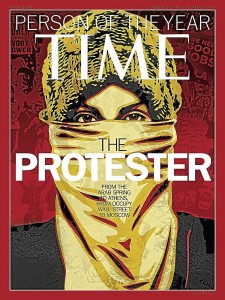
IN HONORING “The Protester,” Time magazine cites dissent across the Middle East reshaping global politics. COURTESY OF TIME MAGAZINE
NEW YORK—“The Protester” was named Time magazine’s person of the year on Wednesday, a tribute to those bringing change across the Arab world as well as anticorporate greed demonstrations in the United States and Europe.
Time said it was recognizing protesters because they were “redefining people power” around the world.
“There’s this contagion of protest,” Time managing editor Richard Stengel said on NBC television. “These are folks who are changing history already and they will change history in the future.”
The shared honor for protesters beat the traditional individual contenders, who included Admiral William McRaven, commander of the US mission into Pakistan in May that killed al-Qaeda founder Osama bin Laden.
Last year, Time picked Facebook founder Mark Zuckerberg, whose competitors included another 21st century communications guru, WikiLeaks maestro Julian Assange.
US Federal Reserve Chairman Ben Bernanke received the honor in 2009. The 2008 winner was then President-elect Barack Obama. Other previous winners have included Bono, President George W. Bush and Amazon.com CEO and founder Jeff Bezos.
2011 short list
This year, the list centered on heavyweight political figures such as McRaven, Chinese dissident Ai Weiwei, and influential Republican Congressman Paul Ryan, the House budget committee chairman.
There was also an emotional nod for Kate Middleton, who was credited for putting a spring back in the British monarchy’s step with her April wedding to Prince William.
McRaven came in at second place on the Time list. Ai, whose 81-day secret detention by Chinese authorities earlier this year sparked an international outcry, came in at No. 3, followed by Ryan. Middleton rounded out the short list.
“Admiral McRaven captured Bin Laden and (Middleton) captured our hearts. They represent people who affected us in one way or another who swayed the conversation—captured our imagination,” Stengel said.
But he said that in the end, the selection committee was unanimous in backing street protesters, “the men and women around the world, particularly in the Middle East, who toppled governments, who brought democracy and dignity to people who hadn’t had it before.”
No Steve Jobs?
A Washington Post report noted that Apple founder Steve Jobs, despite the global outpouring of grief over his death in October, was not even a contender for the magazine’s cover.
Stengel explained on the “Today” show that the recognition was not a “lifetime achievement award,” the report said.
“We thought ‘these dictators are not going to be toppled.’ And then these people who risked their lives, risked their livelihoods to go out there and brought about change that nobody had expected. It really is a transformational thing and I think it is changing the world for the better,” Stengel said.
“Is there a global tipping point for frustration? Everywhere, it seems, people said they’d had enough,” he added in a statement.
Colossal change
“They dissented; they demanded; they did not despair, even when the answers came back in a cloud of tear gas or a hail of bullets. They literally embodied the idea that individual action can bring collective, colossal change,” he said.
The Time award, which is purely honorary and dates back to 1927, noted that while the first and most dramatic protests took place in Muslim countries, they inspired demonstrators across the world.
Popular backlashes against economic turmoil and corruption among elites sparked months of large-scale demonstrations in Spain, Greece, Israel and other countries.
In September, the Occupy Wall Street movement began in New York, quickly spreading to other US cities, while new Russia is seeing rare protests by large crowds against election rigging.
Gaining legitimacy
A protester at the OccupyDC camp in Washington, Kelly Canavan, said the Time magazine honor was “very exciting.”
“It’s inspirational. It shows people are paying attention to us, which is what we’re hoping for,” Canavan told Agence France-Presse.
“Given how many occupations and how many mass movements there are… (this) demonstrates that we’re gaining a lot of legitimacy,” he added.
“Loathing and anger at governments and their cronies became uncontainable and fed on itself,” said Time’s cover article.
“The stakes are very different in different places. In North America and most of Europe, there are no dictators, and dissidents don’t get tortured,” the article said.
“Any day that Tunisians, Egyptians or Syrians occupy streets and squares, they know that some of them might be beaten or shot, not just pepper-sprayed or flex-cuffed,” it added.
Time magazine, featuring a cover photo of a female Arab protester, goes on the newsstands on Friday. Reports from AFP, AP and Reuters